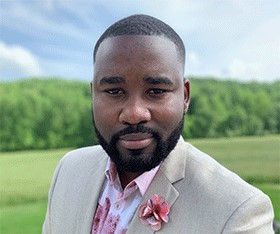Keon Reid, M.S.

Keon Reid
Director of Product Commercialization, Strategic Partnerships, and Initiatives
Fiserv, Inc.
B.S., Chemistry, Georgia State University
M.S., Computational Chemistry, Emory University
Keon Reid remembers when his pH indicator turned a solution pink during a 10th-grade titration experiment. That instant, when the acidic solution became basic before his eyes, was the moment his fascination with chemistry began.
A native of Jamaica, Reid moved to Atlanta at age 11. After high school, he majored in chemistry at Georgia State where he earned the Best Overall Chemistry Scholar Award from the department of chemistry in 2011. As a graduate student and National Science Foundation Graduate Research Fellowship Program recipient at Emory University, he used computational chemistry to explore cancer therapies. He then landed a job in a totally different field: financial technology.
Today, Reid is a director at Fiserv, a global company offering financial tech services, such as tools for accepting credit card payments. He no longer uses chemistry in his day-to-day work. But the diverse skill sets he developed as a chemist—from technical writing to communication—are integral to his success in financial tech.
Going into a new industry requires you to learn its language and functions, says Reid. You can then use your own unique background to offer fresh perspectives beyond the industry’s norm.
I want to make sure that my natural gifts are in tune with whatever I’m doing—and that whatever I’m working on is helping people.
As a graduate student, how did you use computational chemistry tools to explore cancer treatments?
I ran computer simulations to understand how an anticancer peptide would interact with healthy cells versus cancer cells. A cancer cell is negatively charged while a healthy cell is neutrally or slightly positively charged. The peptide I studied was positively charged, so it targeted the cancer cells and disrupted their membranes while leaving the positively charged healthy cells alone.
After graduate school, you pivoted to a career in financial tech. Why did you make that switch?
I didn't want to leave Atlanta because my wife and family were here. But I couldn’t find work as a computational chemist in the area. The spouse of a colleague from Georgia State offered me a proposal management position at Fiserv. She knew that I didn’t have experience in the financial tech space. But she recognized that my ability to write and present clearly about technical topics could translate beyond chemistry.
In your first position at Fiserv, as a proposal manager, you wrote proposals to win business from companies seeking specific financial services, like fast-food chains looking for a vendor to help them accept credit card payments. What was the learning curve like when you entered that position?
It was exciting but hard. From graduate school, I already had some core experience in technical writing. And I had experienced communicating with peers, PIs, my committee, and my collaborators. I also had project management experience from running my research. Those were skills that I brought into the new role.
But my new position was much different. I had to work with several different teams—the legal team, marketing team, compliance team, and sales organization. My role required me to collaborate heavily with both internal and external stakeholders. I had to draw out their key inputs for the proposal and learn how to manage the end-to-end proposal process. It took me about 4 to 6 months to really learn how to communicate clearly with all these groups and learn to produce a competitive, winning bid.
Now you are in a new role at Fiserv as a senior product manager of commercialization. Can you tell us about a project that you were excited to be a part of?
In commercialization, part of my job is working with our company’s partners to marry whatever new products or services they have with our existing technology infrastructure. A lot of the work I do is helping our strategic partners put their app on our Clover device, our point-of-sale system that you would use when checking out at a store.
During the COVID-19 pandemic, we helped PayPal add their QR code on our Clover devices as a new payment tender type so customers at stores and restaurants could check out via a safe, touch-free experience. Right now, thousands of merchants across the country use that product.
How can chemistry students interested in making a similar career transition highlight transferable skills when applying for jobs?
Leverage your current skill of doing research. Look for keywords and requirements in the job posting and think about how they map to what you're currently doing in some shape or form. Then make those transferable skills more pronounced in a results-based format on your résumé. Maybe a management job requires time tracking, for example. You can highlight how you track the time for your experiments with high efficiency.
You also run your own consulting business to help individuals and small businesses advance their professional goals. How do you manage so many responsibilities?
Depending on what season I am in, it can be challenging. Before I became a dad last year, I had a little bit more free time. But I try to prioritize my deliverables in order to put in consistent effort with whatever time I have. And I stay focused on my end goals. I look at life through a communal lens to see which areas I can best serve in. I want to make sure that my natural gifts are in tune with whatever I’m doing—and that whatever I’m working on is helping people. If you have your goals in mind and you’re diligent towards them, you will achieve them.

